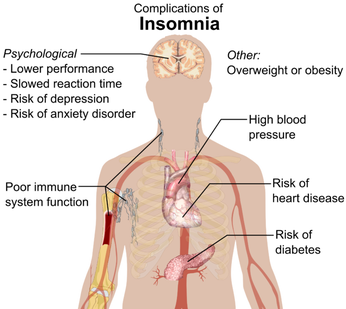Insomnia

Insomnia is sleeplessness, which can be: temporary insomnia or chronic insomnia. Insomnia can manifest in the inability to fall asleep at night or in the inconvenience of waking up in the middle of the night or too early in the morning without feeling refreshed.
In all these cases insomnia can easily become a devil’s circle: If one night we cannot fall asleep, the next evening we might be more worried about another night of sleeplessness, and thus insomnia is even more likely to occur. Anyone suffering from insomnia knows that trying to fall asleep and especially telling ourselves that we must get a good night’s sleep (because tomorrow is an important meeting, day at work etc), will only make insomnia worse. The first rule in treating insomnia therefore almost always must be: Do not try to force sleep, and do not worry.
These thing are easier said than done. Insomnia is a seriously burdening condition, which robs us from our energies and enjoyment of life. Hypnotherapy can help, however, to really feel relaxed about it and to free ourselves from insomnia for good. Insomnia is a condition which derives from our unconscious, and hypnosis is a way to access the unconscious mind directly. Everyone who suffers from insomnia, will also benefit from learning self-hypnosis (which your hypnotherapist can teach you in your hypnotherapy session). As an additional benefit, hypnosis is a relaxing state of mind, which can help you to re-charge after prolonged periods of insomnia.
Additionally to hypnotherapy, it helps to get into healthy and regular sleeping habits. Insomnia is made worse by taking stimulants (like coffee, taurine), especially in the evening. Insomnia can also be made worse by drinking alcohol in the evening, since alcohol can be a stimulant in low doses. It helps to combat insomnia to avoid daytime naps, and rather to go to bed at the same time each night. Rituals can help to get you into the mood for sleeping: like drinking herbal tea from the same favourite cup before bed-time and using the bed only for sleep and nothing else. (Our mind is an instrument easy to be conditioned: it reacts to such things by remembering old associations. If a certain cup is associated with sleeping, using it will make us sleepy. For the same reason, it is important to use the bed only for sleeping and no other activities that might trigger a wake-up response). De-clutter your bed-room and make it free of electronic devises. Most importantly for everyone suffering from insomnia: Make sure you get a lot of exercise, and spend time outdoors whenever possible.
For further questions about insomnia and its treatment, please feel free to contact us here.
In all these cases insomnia can easily become a devil’s circle: If one night we cannot fall asleep, the next evening we might be more worried about another night of sleeplessness, and thus insomnia is even more likely to occur. Anyone suffering from insomnia knows that trying to fall asleep and especially telling ourselves that we must get a good night’s sleep (because tomorrow is an important meeting, day at work etc), will only make insomnia worse. The first rule in treating insomnia therefore almost always must be: Do not try to force sleep, and do not worry.
These thing are easier said than done. Insomnia is a seriously burdening condition, which robs us from our energies and enjoyment of life. Hypnotherapy can help, however, to really feel relaxed about it and to free ourselves from insomnia for good. Insomnia is a condition which derives from our unconscious, and hypnosis is a way to access the unconscious mind directly. Everyone who suffers from insomnia, will also benefit from learning self-hypnosis (which your hypnotherapist can teach you in your hypnotherapy session). As an additional benefit, hypnosis is a relaxing state of mind, which can help you to re-charge after prolonged periods of insomnia.
Additionally to hypnotherapy, it helps to get into healthy and regular sleeping habits. Insomnia is made worse by taking stimulants (like coffee, taurine), especially in the evening. Insomnia can also be made worse by drinking alcohol in the evening, since alcohol can be a stimulant in low doses. It helps to combat insomnia to avoid daytime naps, and rather to go to bed at the same time each night. Rituals can help to get you into the mood for sleeping: like drinking herbal tea from the same favourite cup before bed-time and using the bed only for sleep and nothing else. (Our mind is an instrument easy to be conditioned: it reacts to such things by remembering old associations. If a certain cup is associated with sleeping, using it will make us sleepy. For the same reason, it is important to use the bed only for sleeping and no other activities that might trigger a wake-up response). De-clutter your bed-room and make it free of electronic devises. Most importantly for everyone suffering from insomnia: Make sure you get a lot of exercise, and spend time outdoors whenever possible.
For further questions about insomnia and its treatment, please feel free to contact us here.